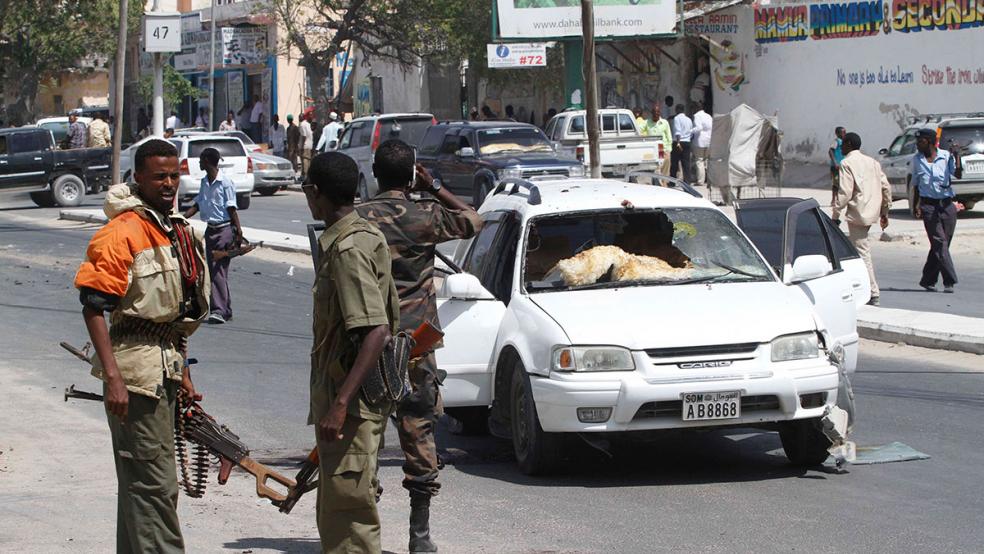Late last month, the U.S. military fired a series of missiles into southern Somalia, aiming to take out a leader of al-Shabaab, the radical Islamic movement with ties to al Qaeda. This follows an October raid by Navy SEAL Team Six, who attacked al Shabaab militants in the Somali coastal city Barawe.
These attacks are in response to al Shabaab’s September siege of Westgate Mall, a shopping center in Nairobi popular with westerners. The three-day siege took at least 67 lives.
Related: Obama's Use of Drones Gives Al Qaeda the Edge in Iraq
This incident put al Shabaab on the map, and made them a target of the U.S. military. According to Director of National Intelligence James Clapper, groups like al Shabaab are forming across Africa, targeting Western targets and terrorizing locals. With the war in Afghanistan winding down and the core of al Qaeda largely decimated, small groups -- most of which you’ve probably never heard of -- are an emerging threat to U.S. national security.
“The continent has become a hothouse for the emergence of extremist and rebel groups, which increasingly launch deadly asymmetric attacks, and which government forces often cannot effectively counter due to a lack of capability and sometimes will,” Clapper wrote of Africa in his 2014 Worldwide Threat Assessment. “Additionally, a youth bulge will grow with unfulfilled economic expectations and political frustrations; conflict will increase for land and water resources; and strengthening transnational criminal networks will disrupt political and economic stability.”
The threat from groups like al Shabaab is so severe that Defense Secretary Chuck Hagel visited Somalia's president and his top advisers after Westgate to see how the United States could help train Kenyan troops. After the October raid in Somalia, Hagel vowed to conduct similar ones to stop terror groups elsewhere.
Related: Did The White House Overstate the Al Qaeda Threat?
“We will continue to maintain relentless pressure on terrorist groups that threaten our people or our interests," Hagel said. "We will conduct direct action against them, if necessary, that is consistent with our laws and our values."
As this threat increases, the United States is transitioning its response. Now, instead of using large number of troops, Special Forces and air strikes are the preferred methods of engagement. But how Special Forces spend their $10 billion budget is a secret; despite pressure from Congress, they don’t reveal where the money goes.
Chances are, a lot of it is going to Africa. Here are the four groups that pose a dire threat to American interests
Al Shabaab - The Westgate attack was the group’s most visible. But they conduct smaller operations, from car bombings to thefts, regularly in Kenya and Somalia. For instance, in December, members of the group in Nairobi killed four when they bombed a bus. In 2010, during the World Cup Final, they bombed a nightclub in Uganda, killing 74.
Related: Marco Rubio: Obama Could Arm al Qaeda in Syria
The United States has already targeted al Shabaab leaders in Somalia. Now, the FBI is in Kenya, helping in the investigation into Westgate.
Boko Haram - Boko Haram emerged in the summer of 2011, when it bombed U.N. headquarters in Nigeria’s capital Abuja, killing 21. Since then, it’s been waging a campaign of terror across northern Nigeria, killing more than 1,000. Just yesterday, they killed 51 in a random attack in a small town in north Nigeria.
It’s not clear if Special Forces are involved in the hunt for the group. But the United States is providing assistance in the form of training; last month, Nigerian President Goodluck Jonathan announced the creation of an Army Special Operations Command, with help in the form of training and equipment from U.S. Special Forces.
Jonathan wants more. In a meeting with President Obama last year, he pleaded for more intelligence sharing and equipment.
"For you to fix the world, you must fix Africa," Jonathan told the president last September. "For you to fix Africa, you must fix Nigeria."
Al Qaeda in the Islamic Maghreb - This group, also known as AQIM, is active across North Africa, including Algeria, Tunisia, Mali and Morocco. Their biggest victory against the west was a successful attack against a French oil facility in Algeria, killing 39.
The most aggressive offensive against AQIM is taking place in Mali, where French-led troops have the group on the run. U.S. Special Forces are there as well, although in an unknown capacity. The only reason their activities became known is an auto accident that killed three soldiers, revealing their presence.
Jabhat al-Nusra - This is the al Qaeda group active in Syria. It’s been described as the most effective rebel group in Syria, and has some 20,000 members.
The group isn’t a direct threat to western interests right now. But if the rebels manage to defeat Syrian President Bashar al Assad, they could become lethal to Europe and the United States. From Syria, it’s relatively easy to access mainland Europe and flights connecting to the homeland.
This is what Clapper said he feared from this and other groups fighting for the future of Syria.
“Syria has become a significant location for independent or [al Qaeda]-aligned groups to recruit, train, and equip a growing number of extremists, some of whom might conduct external attacks,” he warned.
Top Reads from the Fiscal Times:





